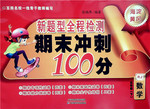题目内容
Maria was thoroughly embarrassed, _____ her parents treated her like a child.
A.and B.for C.but D.or
B

练习册系列答案
 新题型全程检测期末冲刺100分系列答案
新题型全程检测期末冲刺100分系列答案
相关题目
题目内容
Maria was thoroughly embarrassed, _____ her parents treated her like a child.
A.and B.for C.but D.or
B

 新题型全程检测期末冲刺100分系列答案
新题型全程检测期末冲刺100分系列答案